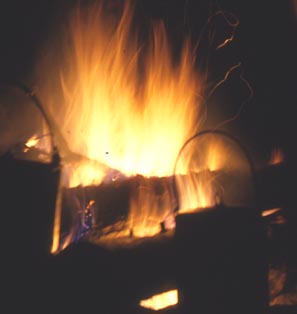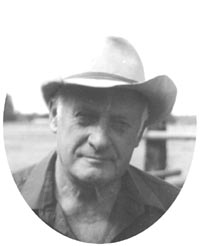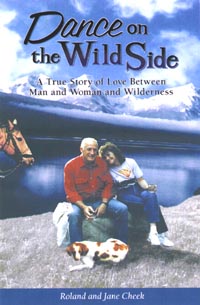a weblog sharing info on outdoor skills and campfire musing by a guy who spends a bunch of time in pursuit of both
CULTURE
WHERE -
TALES ARE TOLD OF
Welcome to Roland Cheek's Weblog
Roland is a gifted writer with a knack for clarifying reality. Looking forward to more of his wisdom
- Carl Hanner e-mail
What is the "crisis period" in one's life? Some say entry into the teens, others claim puberty. What about leaving the nest? Or entry into college? I asked a hip friend and his immediate quip was, "Exposure to drugs . . . or finally beating them." Certainly marriage constitutes a life change. Someone else might choose entry into the job market. "Children," says my wife. But our kids, though we wouldn't trade 'em, weren't exactly "chosen" so much as just "occurred."
Psst, I've finally identified the real "crisis period." It's next year!
To access Roland's weblog and column archives
Click Here
Tip o' the Day
The caller was from an eastern metropolis. He inquired about a horseback-in, river float-out trip for his two sons, ages 12 and 14, and himself. The South Fork of the Flathead and its fabulous cutthroat trout fishing was what he really wanted. And I wanted to take these folks because he said all the right things to make me think he was seeking our type of adventure: "Yes, Roland, I'd like to introduce the boys to what a real wilderness is like;" "I'd like them to learn about nature and conservation by experiencing it, rather than merely reading about it;" "Personally, I need a break from the hectic pace of my job."
Then he asked if he could bring his .357 magnum . . .
Mistaking his meaning, I said, "Yeah, sure, it's okay. But there's not likely to be a bear problem. We've never . . ."
"I'm not worried about bears. I just want to do some target practice with my sons." And the bubble burst! Mind pictures raced like a cinema reel before my eyes. Visions of wilderness peace and solitude interrupted by thoughtless people wouldn't go away. Just a few days before someone with an assault rifle blazed away late into the evening, near our end-of-the-road corral. Now here was a guy who seemed willing to do the same. Instead of attempting persuasive diplomacy, I told him what I thought.
He was silent for a long time, then sighed and said, "It's not easy to raise a couple of boys in Chicago. They're good kids and my wife and I work hard at instilling a firm set of values into them. Me? I'd like them to have a love and appreciation for the things I cherish. The right and opportunity to own and shoot firearms is one of those things."
He sighed again. "What is wilderness for, Roland, if it's not for a father to teach his sons how to shoot? Or fish? or smell the roses? Do you know how many places there are in Chicago where I can take my sons to teach them how to safely use a handgun?"
"No, but . . ."
"Maybe your interpretation of what purpose wilderness is for is too narrow -- have you ever thought about that?" He hung up abruptly.
I did think about it and I became ashamed. Surely wilderness should be a place where a citizen might indulge in historical pursuits difficult to accomplish where the press of civilization prohibits it. Wilderness should be a repository of opportunity for doing things the old ways.
Did I have any right to infer that wilderness was an inappropriate place for a father to teach his sons how to shoot?
No. I would consider it an inappropriate place for me to teach my son how to shoot because I dwell in a land where both place and opportunity are plentiful. But for a man from the city? Huh-uh.
I wish he'd have stayed on the phone long enough for me to admit it.
HUNTING SHARE VS MARKET SHARE
Ever wonder about the secret ingredient that makes for a successful hunter?
Why does one individual seem luckier than another? Is one more sensitive to nature's nuances? Has the successful hunter completed the equivalency of a doctorate in interpreting the chatter of pine squirrels or the raucous cries of whiskey jacks? Does he or she read shifting wind currents more accurately? Have they mastered big-picture weather patterns known only to wild creatures?
Or does the regularly successful hunter carry a bigger magnum to reach from one mountain range to the next? Or possess more pocketfuls of gadgets: spotting scopes, GPS devices, buck scents, cow calls, camouflage designs?
Identifying and discovering reasons for others' success is a common parlor game played by metropolitan society matrons, captains of industry, and connoisseurs of fields and forests. Uncovering THE singlemost secret of competitors' success is the universal dream of Madam Vanderbilt, Bill Gates, and Ogg the mammoth hunter. But the truth is there is no single reason why one captain becomes wealthy while thousands do not; why one matron is constantly copied while others are not; why one hunter seems phenomenally successful while you and your partners are not.
But in the case of hunting and hunters, one can come nearer to reducing success to one single element than with Vanderbilt or Gates. That element is time.
Time afield is the common thread tying all really successful hunters together, whether they pursue chukars amid Snake River canyons, pheasants in South Dakota cornfields, honkers in Alberta stubble, or elk around the Yellowstone Plateau.
Who has the best-trained dogs? Certainly the person who spends time afield with theirs.
Who better understands the whisperings of forest lore? Who but those who gives nature adequate opportunity to speak to them.
The guy who, year after year, stocks his freezer with elk ribs or venison chops is not your garden variety Sunday afternoon hunter. He's not the one who waits to read about the latest hunting "hot spot" in newspaper or magazine before making plans to venture afield.
Nope, he was tramping the hills while remnant snowbanks still clung to north-slope shaded spots in March, counted wedges of ducks and geese winging north in April and May. He was out every chance he had in June, July, and August. And when September, October, and November rolls around, you'll never find him trading a moment of field time in order to watch the Broncos groan against the Seahawks from his living room sofa.
So forget about rifle calibers, optic qualities, and direction devices. Dump the idea that the guy you envy somehow took a language course in wildlife-speak, or has a better "feel" for landforms than you'll ever acquire from Planet Earth television or the Map Quest computer program. It isn't who you know, or even what you know, but how you learned it--by being there and doing that.
Give Ogg credit where credit is due--that he takes his hunting share as seriously as Bill Gates takes his market share.
Roland Cheek wrote a syndicated outdoors column (Wild Trails and Tall Tales) for 21 years. The column was carried in 17 daily and weekly newspapers in two states. In addition, he scripted and broadcast a daily radio show (Trails to Outdoor Adventure) that aired on 75 stations from the Atlantic seaboard to the Pacific Ocean. He's also written upwards of 200 magazine articles and 12 fiction and nonfiction books. For more on Roland, visit:
www.rolandcheek.com
Recent Weblogs
Tuesday, October 28, 2008
for more info about these and other Roland Cheek books
There's a bunch of specific info about Roland's books, columns, archives and radio programs. By clicking on the button to the left, one can see Roland's synopsis of each book, read reviews, and even access the first chapter of each of his titles. With Roland's books, there's no reason to buy a "pig in a poke."
for detailed info about each of Roland's books
Read Reviews
Read their first chapters
For interested educators, this weblog is especially applicable for use in history, relationships, and government classes, as well as for journalism students.
Roland, of course, visits schools. For more information on his program alternatives, go to:
NEXT WEEK:
WHAT YOU DO WITH WHAT YOU GOT
www.campfireculture.com
The Phantom Ghost of Harriet Lou is a 352-page book about "the creature" that Roland claims "took me to the wildlife dance." Packed with exciting tales from the years he both hunted elk, and guided others to their lifetime dreams
The best of Roland's 2,700 newspaper columns and radio program scripts. Mostly humor, all personal
Dance On the Wild Side, the story of Roland's & Jane's life together, from childhood sweethearts through five decades of wild adventure!
Two exciting books about the creature Roland says "keeps me dancing."
Learning To Talk Bear is Roland's best selling book, now in its 5th printing. The book describes Roland's own learning experience about the great beasts, profiling several different animals throughout portions of their lives.
Chocolate Legs is an entire book about a single charismatic Glacier National Park grizzly bear who became infamous, with ink spread across Associated Press and the New York Times.
Montana's Bob Marshall Wilderness 9 X 12 Coffee Table book, with 97 full color photos on 80 pages, PLUS 10,000 words of "how-to," "where-to" text about the Wlderness one Chief of the U.S. Forest Service called "The Crown Jewell of Our Wilderness System," and another called "The Flagship of America's Wilderness Fleet." The first book ever published about that splended land God insisted on keeping as his own -- just the same today as in 1982, when Roland photographed and wrote the book.
to send this weblog to a friend
to tell Roland what you think of his Campfire Culture weblog
to visit Roland's newspaper columns and weblog archives
source links for additional info








